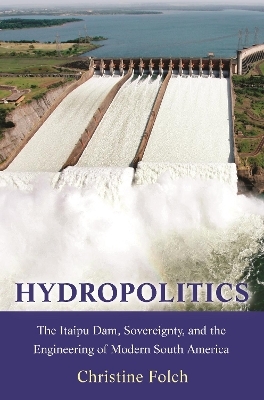
Hydropolitics
The Itaipu Dam, Sovereignty, and the Engineering of Modern South America
Seiten
2019
Princeton University Press (Verlag)
978-0-691-18659-7 (ISBN)
Princeton University Press (Verlag)
978-0-691-18659-7 (ISBN)
An in-depth look at the people and institutions connected with the Itaipu Dam, the world's biggest producer of renewable energyHydropolitics is a groundbreaking investigation of the world's largest power plant and the ways the energy we use shapes politics and economics. Itaipu Binational Hydroelectric Dam straddles the Parana River border tha
An in-depth look at the people and institutions connected with the Itaipu Dam, the world’s biggest producer of renewable energy
Hydropolitics is a groundbreaking investigation of the world’s largest power plant and the ways the energy we use shapes politics and economics. Itaipu Binational Hydroelectric Dam straddles the Paraná River border that divides the two countries that equally co-own the dam, Brazil and Paraguay. It generates the carbon-free electricity that powers industry in both the giant of South America and one of the smallest economies of the region. Based on unprecedented access to energy decision makers, Christine Folch reveals how Paraguayans harness the dam to engineer wealth, power, and sovereignty, demonstrating how energy capture influences social structures.
During the dam’s construction under the right-wing military government of Alfredo Stroessner and later during the leftist presidency of liberation theologian Fernando Lugo, the dam became central to debates about development, governance, and prosperity. Dams not only change landscapes; Folch asserts that the properties of water, transmuted by dams, change states. She argues that the dam converts water into electricity and money to produce hydropolitics through its physical infrastructure, the financial liquidity of energy monies, and the international legal agreements managing transboundary water resources between Brazil and Paraguay, and their neighbors Argentina, Bolivia, and Uruguay.
Looking at the fraught political discussions about the future of the world’s single largest producer of renewable energy, Hydropolitics explores how this massive public works project touches the lives of all who are linked to it.
An in-depth look at the people and institutions connected with the Itaipu Dam, the world’s biggest producer of renewable energy
Hydropolitics is a groundbreaking investigation of the world’s largest power plant and the ways the energy we use shapes politics and economics. Itaipu Binational Hydroelectric Dam straddles the Paraná River border that divides the two countries that equally co-own the dam, Brazil and Paraguay. It generates the carbon-free electricity that powers industry in both the giant of South America and one of the smallest economies of the region. Based on unprecedented access to energy decision makers, Christine Folch reveals how Paraguayans harness the dam to engineer wealth, power, and sovereignty, demonstrating how energy capture influences social structures.
During the dam’s construction under the right-wing military government of Alfredo Stroessner and later during the leftist presidency of liberation theologian Fernando Lugo, the dam became central to debates about development, governance, and prosperity. Dams not only change landscapes; Folch asserts that the properties of water, transmuted by dams, change states. She argues that the dam converts water into electricity and money to produce hydropolitics through its physical infrastructure, the financial liquidity of energy monies, and the international legal agreements managing transboundary water resources between Brazil and Paraguay, and their neighbors Argentina, Bolivia, and Uruguay.
Looking at the fraught political discussions about the future of the world’s single largest producer of renewable energy, Hydropolitics explores how this massive public works project touches the lives of all who are linked to it.
Christine Folch is assistant professor of cultural anthropology and environmental science and policy at Duke University. Twitter @christinefolch
| Erscheinungsdatum | 22.08.2019 |
|---|---|
| Reihe/Serie | Princeton Studies in Culture and Technology |
| Zusatzinfo | 12 b/w illus. 5 tables. 3 maps |
| Verlagsort | New Jersey |
| Sprache | englisch |
| Maße | 156 x 235 mm |
| Themenwelt | Naturwissenschaften ► Biologie ► Ökologie / Naturschutz |
| Naturwissenschaften ► Geowissenschaften ► Hydrologie / Ozeanografie | |
| Sozialwissenschaften ► Ethnologie | |
| Sozialwissenschaften ► Soziologie | |
| Wirtschaft ► Betriebswirtschaft / Management | |
| ISBN-10 | 0-691-18659-6 / 0691186596 |
| ISBN-13 | 978-0-691-18659-7 / 9780691186597 |
| Zustand | Neuware |
| Haben Sie eine Frage zum Produkt? |
Mehr entdecken
aus dem Bereich
aus dem Bereich


